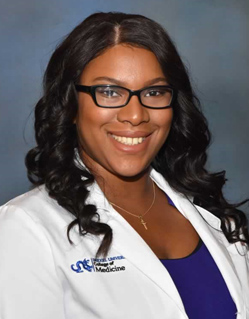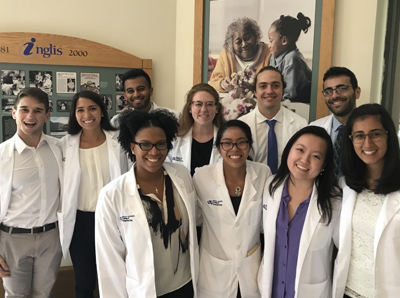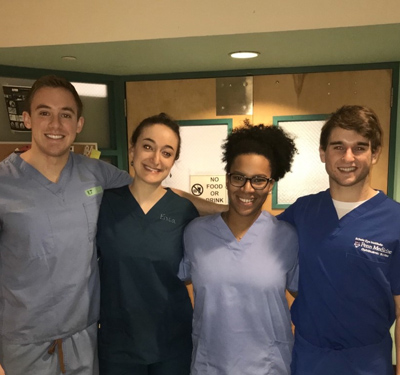Meet Dominique Jones
“I felt like I was giving back to my community” Woman One scholar and lifelong Philadelphian looks back on medical school ahead of Match Day
By Lisa Ryan

Hometown: Philadelphia, Pennsylvania
Undergraduate: George Washington University, BS in Biology; minor in Public Health
Graduate: Hampton University, MS in Medical Science
Can you tell me a little bit about yourself before you came to Drexel?
Just prior to Drexel, I was in a post-bac program at Hampton University and working part time as an emergency room scribe. I really enjoyed the scribe position because it allowed me to get familiar with charting and medical terminology prior to starting medical school. In undergrad, I was very active in my sorority, Alpha Kappa Alpha Sorority, Inc. Mu Delta Chapter; I served as the secretary and later president of the chapter.
What drew you to medicine, and to the College of Medicine specifically?
I never had an “ah-ha!” moment when I decided to pursue medicine, but I remember wanting to be a doctor as early as 11 or 12 years old. I’ve always loved science and thought the human body was the coolest thing ever. Another thing I always knew was that I wanted to help others, especially the Black community. Going into medicine felt like the most natural way for me to combine those two loves — science and bettering my community. Since giving back to my community is such a big part of my life, being able to come back to my hometown for medical school was a major factor in choosing the College of Medicine.

What organizations, extracurriculars, research or community service experiences have you been involved in at Drexel? How have they impacted your experience here?
During my first year at Drexel, I was involved with the pediatrics interest group where I was able to shadow various pediatric specialists at St. Christopher’s Hospital for Children and attend panel discussions about the different areas of pediatrics. In keeping with the pediatrics theme, I also volunteered at John B. Kelly Elementary School during first and second year; I went into a kindergarten class and assisted the teacher with reading and writing exercises, working with the kids either one on one or in small groups. I really enjoyed this experience because so much of health is influenced by things like education, and this was an opportunity where I could work with predominately low-income Black students to improve their reading and writing skills early in their lives.
Additionally, I am a member of the Student National Medical Association (SNMA) and was co-president for the Drexel chapter during my second year. From panel discussions given by attending physicians to our annual “Taste of Soul” fundraiser, SNMA was always a big family that helped students with academic and professional development, as well as with building their social support systems. Through SNMA I was able to turn classmates into lifelong friends.
What specialty do you plan to go into? What influenced that choice?
I am hoping to match into pediatrics. As the oldest of four siblings, I’ve always taken on the role of nurturer and mentor when it comes to younger children. I really enjoy being able to help my patients with their physical health, while also being able to help them with other areas of their life. Being a pediatrician allows me to be a role model for young patients and to work with them as they grow up.
What are some of your favorite medical school memories? What lessons have you learned here that you'll carry on into residency?
One of my favorite memories was definitely hosting the 2018 Racism in Medicine Conference. It took about 10 months of planning and lots of coordination, so to see it finally come to fruition was incredible. Another great memory is the White Coat Ceremony. As the first person in my family to go to medical school, it was a big moment to be on the stage receiving my white physician’s coat in front of my loved ones.
A lesson I’ll carry with me into residency is to never be afraid to ask for help. Whether it was a difficult topic in class or extracurriculars piling up, my classmates and professors always made themselves available to help if I needed them. I think this is such an important lesson, because none of us can do everything alone. Once you realize there are others willing to help you, it becomes so much easier to succeed.
You were a founder of DUCOM StAR: Students Against Racism, and coordinated the annual Racism in Medicine Conference, a forum for the important topic of identifying and eliminating racism and discrimination in the medical profession. What inspired this work? As you reflect on the work, what do you feel you learned from it, and how do you feel it influence your med school experience?
The values that motivated my work with StAR and the Racism in Medicine Conference are ones that have always been important to me, even prior to entering medical school. As a Black woman, racism and discrimination are topics that I don’t have the privilege to ignore or to only pay attention to when it’s convenient for me. Because medicine is a white, male dominated field, and has many of its roots in racism, it is important for me to highlight how the current culture of medicine is working against both patients and providers of color. In addition to highlighting the issues in medicine, it is equally as important, if not more important, to take action to fix those issues. Helping make the field of medicine more accessible and safer for minority communities is what keeps me motivated to continue doing the work.
I’ve learned so much during my time working on different anti-racism projects, but one thing that will always stick with me is that although you may not be able to change someone’s mind, you can change policy. I heard that phrase during my interview from a faculty member at a program where I applied, and it really resonated with me. Unlearning multigenerational, unconscious bias is hard work, and it takes intentionality to do it every day. Policy, on the other hand, is more concrete, and once you can show a correlation between a policy and poor health outcome, the easier it becomes to change the policy and therefore to change the outcomes for those affected by it.

You are also a Woman One scholar – what did that role entail, and how did it influence your time in med school?
The Woman One Scholarship is an award given by the Institute for Women’s Health and Leadership to underrepresented women in medicine who are committed to practicing medicine in underserved communities. I found out that I was a recipient of the award on the same day I was accepted to the College of Medicine, so it was a very emotional and exciting day.
Woman One scholars attend the annual Woman One Award Ceremony, where the Institute honors a local woman for exceptional leadership in her field. Outside of the award ceremony, we meet a few times a year with our sponsors or with faculty in the Institute to talk about school and the extracurriculars we are involved in. My co-recipient of the Woman One Scholarship for the class of 2021 is one of my closest friends, and I think Woman One had a lot to do with bringing us together.
Having a large portion of tuition paid for through the scholarship was a huge burden off my shoulders as I went through school and now as I look to the future. As the first person in my family to go to medical school, none of us really knew how expensive it would be when you factor in tuition, living costs, study materials, etc. The scholarship was a relief not only to me but also to my whole family.
What has it been like going through medical school in the same city where you grew up?
It’s so great! Medical school was hard, and would have been hard at any school, so being able to see my family during a rough patch or being able to be present for holidays and birthdays definitely made me appreciate being in Philly.
On another note, once I got to my clinical rotations, it was nice being in Philly because I felt like I was giving back to my community. I felt like I was working toward the goals I set at a young age by providing quality health care to patients who look like me.
How are you feeling ahead of Match Day? What are you looking forward to about the next step in your medical career?
I feel really good going into Match Day. I know that I’ve worked hard both in and out of school, and I had an interview season that went well. I’m a big proponent of not stressing over things you can’t control, so once I submitted my rank list, I told myself there’s nothing to stress about now because I did my part.
I’m excited for the next phase of my training, and to be able to focus on the specific needs of children, adolescents and young adults. I look forward to continuing to grow as a clinician and patient advocate. Becoming a physician is signing up for a lifetime of learning, and I am excited to learn more while being able to teach those who will come after me.
Back to Top